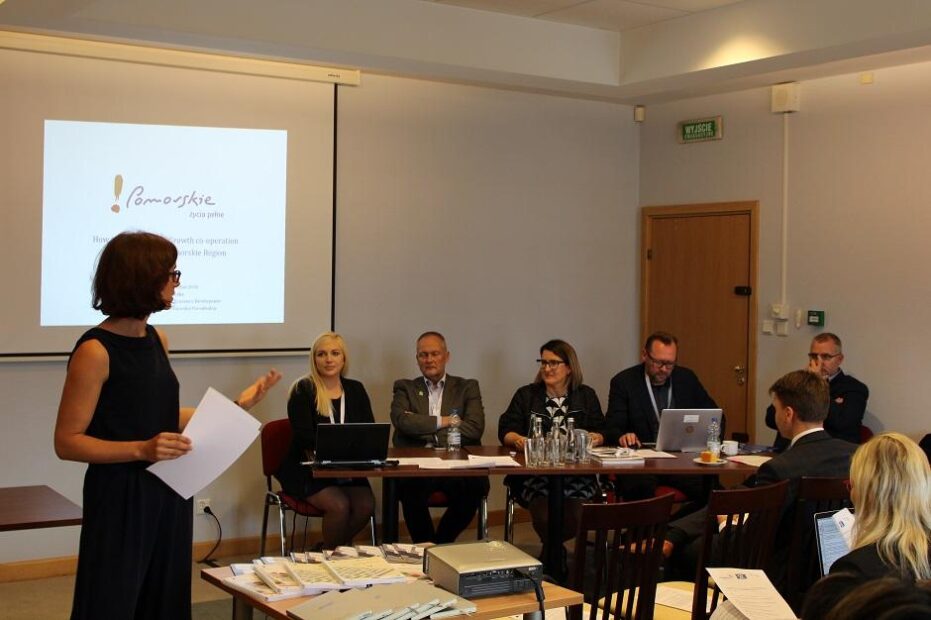Uwaga
Ten artykuł pochodzi z archiwum serwisu WWW i może nie spełniać kryteriów związanych z dostępnością definiowanych przez standard WCAG2.1AA.
The Annual Baltic Sea States Sub-regional Cooperation Conference took place from 10-12 September in Gdansk, Poland. This year, the theme was solidarity, participation and smart action for a better future. Smart Blue Regions project partner “Association Pomorskie in the EU”, was the main organiser of the workshop “Smart societies – Blue Growth regions” happening on the 1st day of the conference.
The session moderated by Christin Skiera (Innovation for Policy) aimed to investigate with practitioners from three projects and policymaker the following:
(1) What were the output and outcome of the transnational partnership on ‘Blue Growth’?
(2) How contributed Smart Specialisation to its progress? When was it no catalyst for the collaboration and why? How to develop the Smart specialisation tool further?
The speakers presented three projects. Magda Leszczyna-Rzucidło (Pomorskie in the EU) and Karolina Lipińska ( Deputy Director of the Department of Economic Development, Office of the Marshal of the Pomorskie Voivodship) presented the Smart Blue Regions (Interreg BSR) project concentrating on how to enhance Blue Growth co-operation based on regional RIS3 in Pomorskie region. They introduced the project preliminary results and lessons learned from the transnational workshops on maritime skills development, offshore wind energy, marine tourism and cluster cooperation, where various stakeholders identified over 30 cross-border project themes.
Karsten Aunst, from the South Norway European Office, introduced the Periscope (Interreg North Sea) project, where they act as a Lead Partner. Since the workshop was concerned with trans-regional cooperation, in particular, cluster collaboration, he reminded that “PERISCOPE enables success in cluster collaboration, due to its market focus and its bottom-up approach”. PERISCOPE received much positive attention during the event with the audience specifically expressed their interest in the project methodology & toolkit and how companies could become involved in the ecosystem.
Final speaker from the project perspective – Erik Bunis (Senior Project Manager at RISE & Process Manager – OffshoreVäst) focused on the maritime cluster cooperation around the Baltic Sea based on smart specialisation, illustrated by the SMART Ocean initiative. He gave an overview of the initiative whereby working across industry boundaries, stakeholder create a competitive and value-creating environment or research, innovation and business development.
Esa Kokkonen, director of the Baltic Institute of Finland, reminded that even though regions around the BSR desire to leverage their strengths in combination with innovation capacity in the other areas transnationally, the existing structures, operational mechanisms and financing frames are not suited to these transnational ambitions. The participants agreed that we need to develop more integrated innovation support infrastructures and innovation management tools.
On the 2nd day of the conference our project was highlighted again, during the session „Projects predict future: Our region in 20 years” where 6 projects from the BSR, covering issues vital for the long-term development of the Baltic Sea Region (e.g. smart growth, energy, infrastructure, district heating, digitalisation, cultural heritage, mobility etc.) were invited to make predictions 20 years ahead. Joanna Przedrzymirska from Maritime Institute in Gdansk – the project partner in Smart Blue Regions – gave insights to the project findings that are calling for an inter-regional value chains based on individual regional strengths and trustful relations. She also suggested that in the BSR we shall create and strengthen the links between the EC’s Baltic Blue Growth Implementation Strategy and RIS3 and facilitate inter-sectorial development cooperation.
